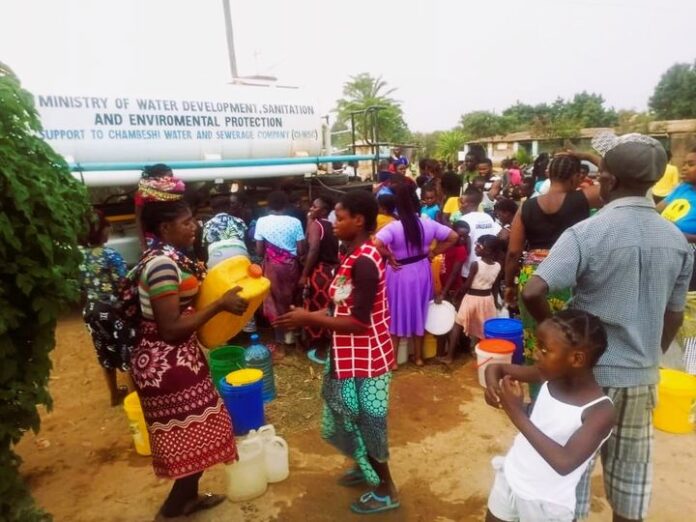By Angela Mtambo & Charles Mafa
When the $53 million water improvement project in northern Zambia was initiated in 2017, many residents in urban towns of the north and Muchinga Provinces harboured hopes that its completion would ultimately alleviate the long-standing water challenges in the area.
However, a recent survey conducted by MakanDay has revealed a disheartening reality.
Despite the project’s completion and its subsequent handover to the Chambeshi Water and Sanitation Company in October 2023, Kasama residents persistently grapple with challenges such as insufficient water supply, the absence of account numbers, and ongoing leakages.
Survey Findings
In places like Mulenga Three, where the project was fully implemented, obtaining pre-paid meters has been challenging, and many homes are unfamiliar with how to pay their bills.
Chiba residents report an improvement in the supply of water and have started receiving bills in some parts. However, there is a need for pipe renovations, as the compound is experiencing numerous leakages leading to water wastage.
Other compounds like Mukulumpe have reverted to the old system and have been receiving water. Some residents mention that the current issue they face is the inability to pay their bills because they don’t know how to use the cards they have been given under the new system.
After the change of the system, customers were issued cards to buy water, but many still need to go back to the water company to learn how to use them. Other parts of Mukulumpe on the new system still don’t have water supply every day.
Namulunda is another area connected to the new system, and residents report that water has become scarce. Most homes do not have account numbers for payment.
A few homes have been disconnected for non-payment, although no bills have been delivered. Most meters have been working perfectly, recording numbers equivalent to slightly above K200 for the past three months, which residents complain will be too much to pay at once. Others have managed to get meter account numbers, but how that happened remains a mystery.
Luoluo compound has customers on both new and old system. Those on the old system enjoy water supply day and night according to schedule, while those on the new system remain without water because pumping is prioritised to the old system where customers with accounts for quick payment are located.
However, customers in New Locations and Newtown have confirmed receiving water supply every day, 24 hours a day, and are enjoying the service, considering they are not part of the multi-million-dollar African Development Bank-backed project.
Company’s response
In October last year, MakanDay sought clarification from the company’s Managing Director, Lackson Simumba, to determine whether there was a connection between the challenges faced by customers and the subpar performance of the employees.
Simumba explained that in 2021, the government had enlisted a consultant to assess qualifications and organisational structures. According to the findings in the assessment report, specific positions were reclassified as unqualified due to structural upgrades.
Link Between Poor Service and Management
However, based on a 2022 assessment by the Global Water Security and Sanitation Partnership (GWSSP), which supported the Zambia Water Supply and Sanitation Sector Diagnostic completed in June 2020, there appears to be a link between insufficient water supply and poor management.
According to GWSP, the predominant focus in the water sector has been on infrastructure rather than on strengthening the institutions responsible for maintaining the system. This lack of emphasis on strengthening these institutions hinders the pursuit of an efficient and sustainable system for service provision.
Furthermore, the GWSP observed that urban sector capital investments have primarily targeted extensive bulk water projects, giving less priority to the rehabilitation and expansion of aging water distribution networks, especially in small towns and areas of high population growth. As a result, a significant portion of the increased water production is lost in leaky networks, undermining efforts to expand access.
Moreover, GWSP noted that the country’s chronically inefficient water utilities are creating a fiscal burden and making it harder for the Government to finance the sector.
For example, during the period 2001-2017, Zambia’s water companies lost an estimated US$858 million due to high levels of non-revenue water (water lost through leaks, or water not billed or both) and low bill collection efficiency.
Regulatory Response and Political Influence
The National Water Supply and Sanitation Council (NWASCO), the regulatory body overseeing water supply and sanitation services, has not yet responded to MakanDay’s request for comments.
The inquiry seeks clarification on various matters, including the reasons behind Nwasco’s apparent lack of attention to the concerns raised by Kasama residents.
Angela, an investigative journalist located in Kasama, is an integral member of the MakanDay network. In recognition of her exceptional work, she was hosted by MakanDay in 2023 after earning the second-place distinction in the 2022 inaugural Awards for Investigative Journalism.

Discover more from MAKANDAY
Subscribe to get the latest posts sent to your email.



